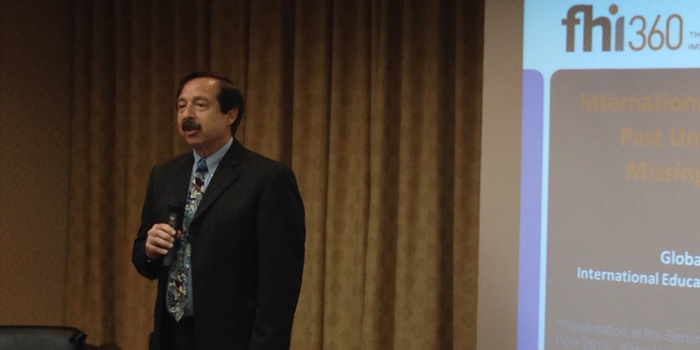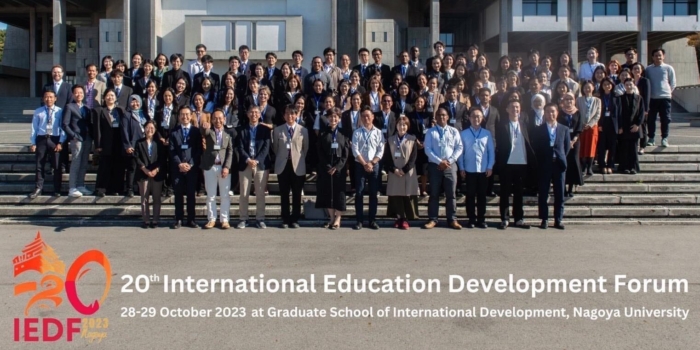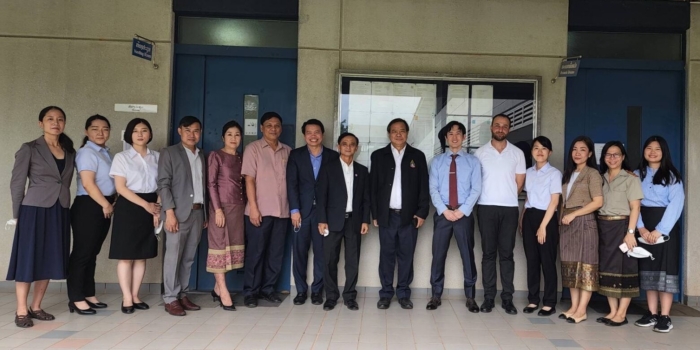On Wednesday 25th June, 2014 the Development Management Policy Seminar was held in the Main Conference Room of Kobe University’s Graduate School of International Cooperation Studies (GSICS), under theme “International Education Cooperation in the Post-2015: From Perspectives of Government and NGO.” The two speakers were Dr. Albert Byamugisha, a Commissioner in the Office of the Prime Minister (OPM) in Uganda, and Dr. Mark Ginsburg, who is a Senior Education Policy Advisor at the FHI360, and a Visiting Researcher at the University of Maryland, USA. The presenters were two education development experts, from the government and from an international NGO respectively.
 Dr. Byamugisha’s presentation title was “Education Development in the Post-2015: Better Evidence, Better Outcomes.” He commenced his presentation by showing a typical life cycle of a policy or program with the decision making processes based on evidence, as well as various factors which could affect decision making in the absence of evidence. In addition, he pointed out several issues in the process of making use of evidence, including the necessity of more support from specialists and the mechanism to turn the results into solutions. He also introduced OPM’s evaluation of Uganda’s Poverty Eradication Action Plan (PEAP) as one of the best practices where better evidence produced better outcomes. Lastly, he raised some issues to be addressed in Post 2015, including how to fill the capacity gap.
Dr. Byamugisha’s presentation title was “Education Development in the Post-2015: Better Evidence, Better Outcomes.” He commenced his presentation by showing a typical life cycle of a policy or program with the decision making processes based on evidence, as well as various factors which could affect decision making in the absence of evidence. In addition, he pointed out several issues in the process of making use of evidence, including the necessity of more support from specialists and the mechanism to turn the results into solutions. He also introduced OPM’s evaluation of Uganda’s Poverty Eradication Action Plan (PEAP) as one of the best practices where better evidence produced better outcomes. Lastly, he raised some issues to be addressed in Post 2015, including how to fill the capacity gap.
Dr. Ginsburg made a presentation on “International Financial Contributions: Past Unfulfilled Promises and Missing Goal for Post-2015.” He started by outlining the repeated demonstrations of financial commitment towards Education for All (EFA) by the international community. He then, compared the overall statistical changes in education spending by different actors, namely individual children/youth, families, governments, international organizations and the private sector. He highlighted the lack of real commitment by the donors although considerable efforts have been made. He also pointed out the potential and limits for private sector contribution towards EFA. To conclude, he proposed a set of clear targets for financing as well as the introduction of an innovative funding scheme.
 After the two presentations, two commentators, namely; Mr. Abdulshukoor Abid, Senior Trainer at the Ministry of Education in Afghanistan, and Ms. Norasingh Phetsourine, Head of Finance Department at the Ministry of Education and Sports in Lao PDR, commented on the two presentations by sharing their countries’ experiences. Mr. Abid mentioned the significant achievement in his country’s education development, especially girls education after the end of civil war in 2001, as well as the remaining challenges which need to be addressed Post-2015. Ms. Phetsourinealso shared with us the educational development experience in the multiethnic country like Laos and stated Post-2015 education agenda in her country.
After the two presentations, two commentators, namely; Mr. Abdulshukoor Abid, Senior Trainer at the Ministry of Education in Afghanistan, and Ms. Norasingh Phetsourine, Head of Finance Department at the Ministry of Education and Sports in Lao PDR, commented on the two presentations by sharing their countries’ experiences. Mr. Abid mentioned the significant achievement in his country’s education development, especially girls education after the end of civil war in 2001, as well as the remaining challenges which need to be addressed Post-2015. Ms. Phetsourinealso shared with us the educational development experience in the multiethnic country like Laos and stated Post-2015 education agenda in her country.
Inspired by the informative presentations and subsequent discussions between the speakers and the commentators, participants including young researchers actively took part in the question and answer session. It was a precious opportunity to enrich our knowledge and understanding of international education cooperation Post-2015, learning from the insightful viewpoints of the leading experts from both government and NGO.
Authored by Katsuki Sakaue
Doctoral Student
Related Link:
http://www.kobe-u.ac.jp/en/NEWS/event/e2014_06_25_02.html
Related








